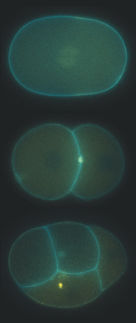How stem cell therapy can keep the immune system under control
Ostrow School of Dentistry of USC study in Cell Stem Cell outlines the mechanism behind stem cells' beneficial effects on immune disorders
Advertisement
A new study, appearing in Cell Stem Cell and led by researchers at the University of Southern California, outlines the specifics of how autoimmune disorders can be controlled by infusions of mesenchymal stem cells.
Mesenchymal stem cells (MSC) are highly versatile stem cells that originate from the mesoderm, or middle layer of tissue, in a developing embryo. MSC can be isolated from many different kinds of human tissue, including bone marrow and the umbilical cord.
Principal investigator Songtao Shi, professor at the Ostrow School of Dentistry of USC Center for Craniofacial Molecular Biology, said that recent studies have shown the benefits of administering MSC to patients with immune-related disorders such as graft versus host disease, systemic lupus erythematosus, rheumatoid arthritis, and more.
These studies showed that infusions of MSC appeared to quell the production and function of overactive immune cells, including T- and B-lymphocytes. However, the specific mechanism behind how MSC get the immune cells under control hasn't been fully understood.
"Mesenchymal-Stem-Cell-Induced Immunoregulation Involves FAS-Ligand-/FAS-Mediated T Cell Apoptosis" shines light on how infused MSCs target and defeat overactive immune cells. Examining the effects of MSC infusion in mice with systemic sclerosis (SS)-like immune disorders, Shi and his colleagues discovered that a specific cellular mechanism known as the FAS/FAS-ligand pathway was the key to the remarkable immune system benefits.
Specifically, in mice with SS-like disorders, infusions of MSC caused T-lymphocyte death with FASL/FAS signaling and lessened symptoms of the immune disorder. However, MSC deficient in FAS-ligand failed to treat immune disorders in SS-afflicted mice.
With the hopeful results of the animal model study in mind, Shi's colleagues in China performed a pilot study with patients suffering from systemic sclerosis. Infusions of MSCs provided similar clinical benefits to patients, and experimental analysis revealed that the FASL/FAS pathway was also at work in humans with SS.
The identification of the cellular workings responsible for the stem cell treatments' success may eventually help doctors find optimal cell-based treatment for some immune diseases, Shi said.
























































